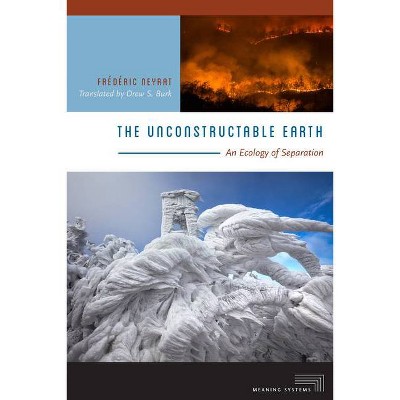Atopias - (Lit Z) by Frédéric Neyrat (Paperback)

Similar Products
Products of same category from the store
AllProduct info
<p/><br></br><p><b> Book Synopsis </b></p></br></br><p>This book offers a manifesto for a radical existentialism aiming to regenerate the place of the outside that contemporary theory underestimates. Neyrat calls this outside "atopia" not utopia, a dreamt place out of the world where everything would be perfect, but atopia, the internal outside that is at the core of every being. Atopia is neither an object that an "object-oriented ontology" would be able to formalize, nor the matter that "new materialisms" could identify. Atopia is what constitutes the existence of any object or subject, its singularity or more precisely its "eccentricity." Etymologically, to exist means "to be outside" and the book argues that every entity is outside, thrown in the world, wandering without any ontological anchor. In this regard, a radicalized existentialism does not privilege human beings (as Sartre and Heidegger did), but considers existence as a universal condition that concerns every being. <p/>It is important to offer a radical existentialism because the current denial of the outside is politically, and aesthetically, damaging. Only an atopian philosophy--a bizarre, extravagant, heretic philosophy--can care for our fear of the outside. For therapeutic element, a radical existentialism favors everything that challenges the compact immanence in which we are trapped, losing capacity to imagine political alternatives. To sustain these alternatives, the book identifies the atopia as a condition of the possibility to break immanence and analyze these breaks in human and animal subjectivity, language, politics and metaphysics.</p><p/><br></br><p><b> Review Quotes </b></p></br></br><br>"Everything is in flux, as we are told over and over again. And yet, these are fluxes in which nothing ever really changes. . . . Other thinkers have characterized globalized and financialized capitalism in this way; Neyrat sees it as a dilemma for critical thought as well. . . . In a world where anything can be anyplace, and anything can switch places with anything else, philosophy must insist on its power to be, not everyplace, but noplace. It must never fit in, but always disturb its context, . . . maintaining a relation with the very Outside that our dominant social, economic, and intellectual conditions seek to deny or suppress. . . . Above all, Atopias is a work of ethics, exhorting us to recognize and find room for the many forms of existence with whom we share our planet."<b>---Steven Shaviro, from the Foreword, <i></i></b><br><p/><br></br><p><b> About the Author </b></p></br></br><br><strong>Frédéric Neyrat</strong> is Assistant Professor of Comparative Literature at the University of Wisconsin-Madison and the author of a dozen books in French on philosophy and environmental humanities. <p/><strong>Walt Hunter</strong> is Assistant Professor of World Literature at Clemson University. <p/><strong>Lindsay Turner</strong> is a poet and translator and holds a Ph.D. in English from the University of Virginia. <p/><strong>Steven Shaviro</strong> is DeRoy Professor of English at Wayne State University.<br>
Price History
Price Archive shows prices from various stores, lets you see history and find the cheapest. There is no actual sale on the website. For all support, inquiry and suggestion messagescommunication@pricearchive.us




















